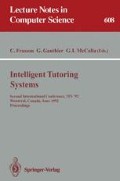Abstract
The GDT approach proposed by Elsom-Cook for merging the Learning Environments (LE) and Intelligent Tutoring Systems (ITS) approaches is set against the background of Karl Popper's epistemology. Popper's distinction between World 1 (the world of physical objects), World 2 (the world of psychological “production”), and World 3 (the world of the “products” of thought, or “objective knowledge”) is used to contrast the trends involved. The resulting picture is one which suggests that merging LE and ITS might be far more difficult to achieve than expected, and that GDT's tutor/student/environment “trinity” might benefit from being reformulated in the light of the Popperian Worldl/World2/World3 “trinity”.
Preview
Unable to display preview. Download preview PDF.
References
J.R. Anderson: A theory of the origins of human knowledge. In Machine Learning: Paradigms and Methods, J.G. Carbonell (Ed.), Amsterdam, The Netherlands: Elsevier Science Publishers B.V., 1989
B.S. Bloom: The 2 sigma problem: The search for methods of group instruction as effective as one-to-one tutoring. Educational Researcher, Vol. 13, No. 6, 1984
J.S. Brown: Toward a new epistemology for learning. In C. Frasson and J. Gauthier, Eds: Intelligent Tutoring Systems at the Crossroad of AI and Education. Norwood, NJ: Ablex, 1989
W.J. Clancey: Methodology for building an intelligent tutoring system. In W. Kintsch, P.G. Polson, J.R. Miller, Eds: Methods and tactics in Cognitive Science. Hillsdale, NJ: Lawrence Erlbaum Associates, 1984
B. Côté: L'ordinateur comme outil et comme interlocuteur en enseignement des mathématiques. Bulletin de l'Association Mathématique du Québec, In Press
M. Elsom-Cook: Guided Discovery Tutoring. London, U.K.: Paul Chapman Publishing, 1990
G. Forman, P.B. Pufall, Eds. Constructivism in the Computer Age. Hillsdale, NJ: Lawrence Erlbaum, 1988
M. Gordon, J. Gordon: Centuries of Tutoring, University Press of America, 1990
J.H. Holland, K.J. Holyak, R.E. Nisbett, P.R. Thagard: Induction: Processes of Inference, Learning and Discovery. Cambridge, Mass.: The MIT Press
D. Hume: Treatise on Human Nature, ed. L.S. Selby-Bigge, Oxford: Clarendon Press, 1888
R.W. Lawler, M. Yazdani, Eds: Artificial Intelligence and Education: Learning Environments and Intelligent Tutoring Systems. Norwood, NJ: Ablex, 1987
B. Magee: Philosophy and the Real World, Lasalla, Illinois: Open Court, 1985
M. Minsky: The Society of Mind. New York: Simon and Schuster, 1985
S. Papert: Mindstorms: Children, Computers, and Powerful Ideas. NY: Basic Books, 1980
R. Pea, E. Soloway: The state of the art in educational technology R&D. Proceedings of the Montreal ITS-88 Conference. Université de Montréal, Juin 1988
K.R. Popper: Objective Knowledge. Oxford, U.K.: Clarendon Press, 1979
R.C. Schank, D.J. Edelson: A Role for AI in Education: Using Technology to Reshape Education. Journal of Artificial Intelligence in Education, Vol. 1 No. 2, 1990
E. Wenger: Artificial Intelligence and Tutoring Systems. Los Altos, California: Morgan Kaufman, 1987
Author information
Authors and Affiliations
Editor information
Rights and permissions
Copyright information
© 1992 Springer-Verlag Berlin Heidelberg
About this paper
Cite this paper
Lamontagne, C., Bourdeau, J. (1992). Towards an epistemology for Guided Discovery Tutoring: The Popperian connection. In: Frasson, C., Gauthier, G., McCalla, G.I. (eds) Intelligent Tutoring Systems. ITS 1992. Lecture Notes in Computer Science, vol 608. Springer, Berlin, Heidelberg. https://doi.org/10.1007/3-540-55606-0_13
Download citation
DOI: https://doi.org/10.1007/3-540-55606-0_13
Published:
Publisher Name: Springer, Berlin, Heidelberg
Print ISBN: 978-3-540-55606-0
Online ISBN: 978-3-540-47254-4
eBook Packages: Springer Book Archive

